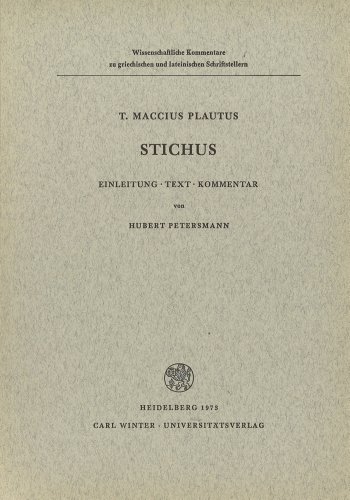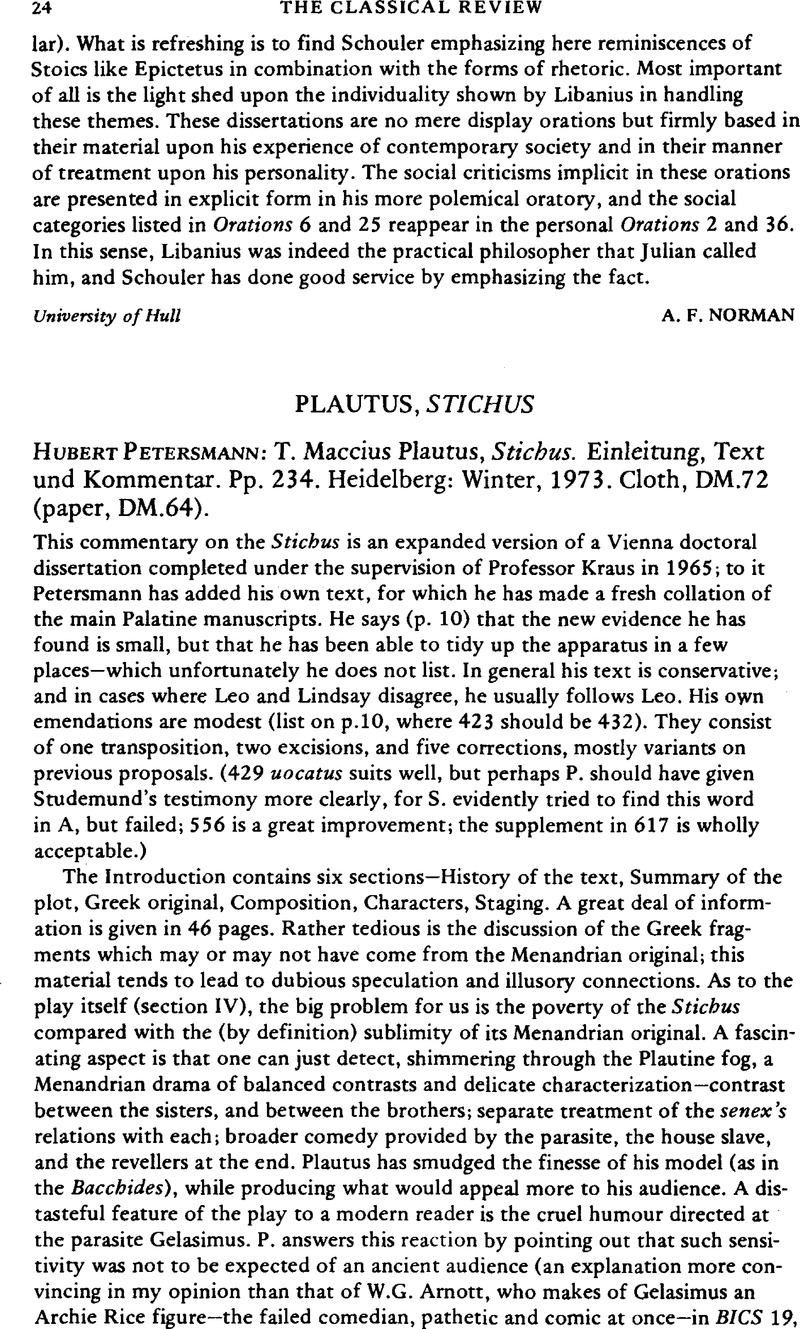Stichus Plautus
Stichus is a comedic Latin play by the early Roman playwright Titus Maccius Plautus. English translation by Henry Thomas Riley at Perseus:. Kannada hit songs download mp3. Much of our knowledge regarding Roman clientelage is drawn from sources later than Plautus.29 Nonetheless, in Stichus the relationship between Gelasimus and the two families clearly is patronal in its asymmetry, expected reciprocity, duration, and personal nature.30 The parasite and the families of the two sisters are, of course, of un- equal status.
Contents • • • • • • • • • • • • • • • • • • • • • • • • • • • • • • • • • • • • • • • • • • • • Biography [ ] Not much is known about Titus Maccius Plautus' early life. It is believed that he was born in, a small town in in northern Italy, around 254 BC. According to Morris Marples, Plautus worked as a stage-carpenter or scene-shifter in his early years. It is from this work, perhaps, that his love of the theater originated. His acting talent was eventually discovered; and he adopted the names 'Maccius' (a clownish stock-character in popular farces) and 'Plautus' (a term meaning either 'flat-footed' or 'flat-eared', like the ears of a hound).
Tradition holds that he made enough money to go into the nautical business, but that the venture collapsed. He is then said to have worked as a manual laborer and to have studied Greek drama—particularly the of —in his leisure. His studies allowed him to produce his plays, which were released between c.


Plautus Stichus Latin
205 and 184 BC. Plautus attained such a popularity that his name alone became a hallmark of theatrical success. Plautus's comedies are mostly adapted from Greek models for a Roman audience, and are often based directly on the works of the Greek playwrights. He reworked the Greek texts to give them a flavour that would appeal to the local Roman audiences.
They are the earliest surviving intact works in Latin literature. Plautus's read: postquam est mortem aptus Plautus, Comoedia luget, scaena est deserta, dein Risus, Ludus Iocusque et Numeri innumeri simul omnes conlacrimarunt. Since Plautus is dead, Comedy mourns, The stage is deserted; then Laughter, Jest and Wit, And all Melody's countless numbers wept together. Manuscript tradition [ ] Plautus wrote around 130 plays, of which 20 have survived intact, making him the most prolific ancient dramatist in terms of surviving work. Only short fragments, mostly quotations by later writers of antiquity, survive from 31 other plays. Despite this, the manuscript tradition of Plautus is poorer than that of any other ancient dramatist, something not helped by the failure of on Plautus to survive.
The chief manuscript of Plautus is a, known as the Ambrosian palimpsest (A), in which Plautus' plays had been scrubbed out to make way for 's Commentary on the Psalms. The monk who performed this was more successful in some places than others. He seems to have begun furiously, scrubbing out Plautus' alphabetically arranged plays with zest before growing lazy, then finally regaining his vigor at the end of the manuscript to ensure not a word of Plautus was legible.
Although modern technology has allowed classicists to view much of the effaced material, plays beginning in letters early in the alphabet have very poor texts (e.g. The end of and start of are lost), plays with letters in the middle of the alphabet have decent texts, while only traces survive of the play Vidularia. A second manuscript tradition is represented by manuscripts of the Palatine family, so called because two of its most important manuscripts were once kept in the library of the in Heidelberg in Germany. The archetype of this family is now lost but it can be reconstructed from various later manuscripts, some of them containing either only the first half or the second half of the plays. The most important manuscript of this group is 'B', of the 10th or early 11th century, now kept in the Vatican library. Surviving plays [ ].
Providing all the tools in a single environment eliminates the time-consuming need for data to be translated between departments, which often results in errors and intelligence gaps. Free trial mcafee virus protection. SOLIDWORKS DESIGN TO MANUFACTURING PROCESS SOLUTION The SOLIDWORKS Design to Manufacturing Solution offers an integrated system enabling design and manufacturing teams to work together concurrently.

Plautus And Terence
For the Italian tradition of farce, see. There are differences not just in how the father-son relationship is presented, but also in the way in which Menander and Plautus write their poetry. Anderson discusses the believability of Menander versus the believability of Plautus and, in essence, says that Plautus' plays are much less believable than those plays of Menander because they seem to be such a farce in comparison. He addresses them as a reflection of Menander with some of Plautus' own contributions. Anderson claims that there is unevenness in the poetry of Plautus that results in 'incredulity and refusal of sympathy of the audience.' Prologues [ ] The poetry of Menander and Plautus is best juxtaposed in their prologues.
Comments are closed.